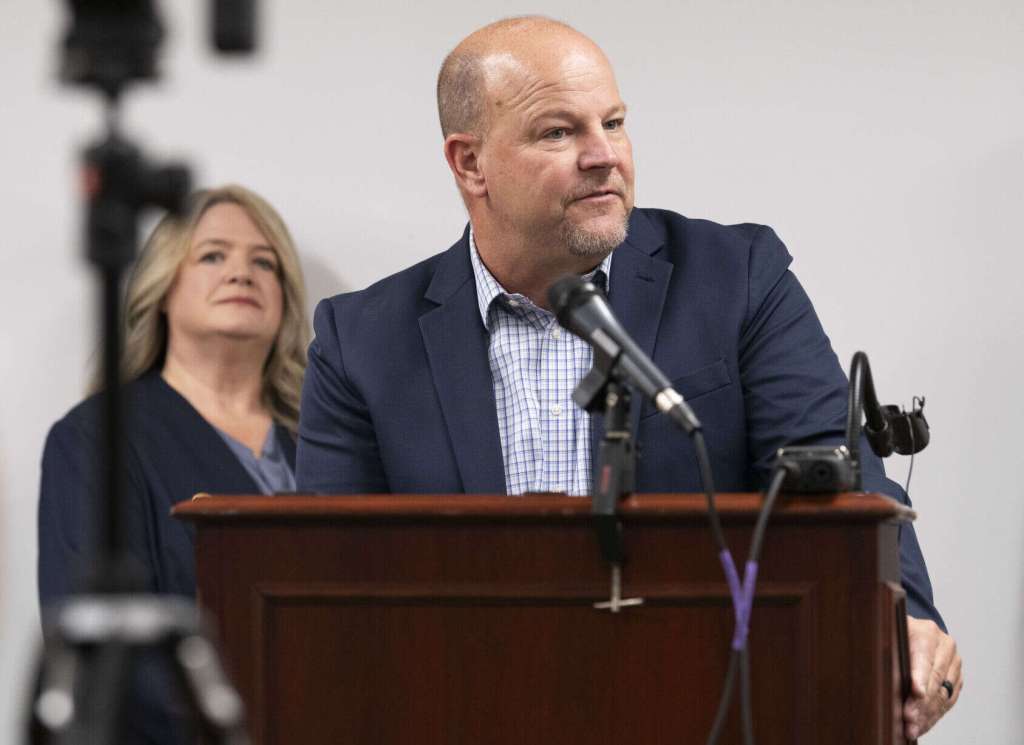Area superintendents warn of Amendment 2 impacts
Published 6:00 am Wednesday, September 25, 2024

- Gary Fields, superintendent of the Bowling Green Independent School District, speaks about Amendment 2 during a press conference from several Kentucky superintendents on Monday at the Lisa Rice Library.
With the November election nearing, four school superintendents spoke Monday evening, as private citizens, about the consequences of Kentucky’s controversial Amendment 2 ballot measure.
The measure would allow Kentucky to direct taxpayer dollars to non-public educational options for children such as private schools, school vouchers and educational savings accounts.
Superintendents of Bowling Green Independent Schools, Owensboro Public Schools, Simpson County Public Schools and Russellville Independent School District spoke on the measure. The Kentucky Center for Economic Policy, a nonprofit think tank that has published multiple analyses on the measure’ s impacts, held the event at the Lisa Rice branch of the Warren County Library.
The superintendents emphasized that the measure alters the Constitution of Kentucky and allows public dollars to be channeled into school choice options without the same government accountability public schools are held to. In doing so, the speakers said, the amendment’s passage can lead to public school students losing out on public education funds, local educators losing jobs and rural communities being especially harmed financially by public dollars getting invested in non-rural communities, among other impacts.
“This voucher amendment will siphon off tax dollars away from public districts across the Commonwealth, not only here in Warren County, and starve students of critical resources needed to be their best,” BGISD Superintendent Gary Fields said.
The event was one of multiple acts of advocacy to be held this week about the measure.
The Green River Regional Educational Cooperative, comprising nearly 50 school districts regionwide, released an informational statement Tuesday that emphasized the potential consequences of Amendment 2. It underlines, “In other states, where voucher amendments are being used, there is evidence that funding for the system of common or public schools has declined.”
As they spoke on Amendment 2 Monday, the superintendents cited the Kentucky center’s findings about how a voucher program such as Florida’s would impact districts across Kentucky. BGISD would experience a 15% budget reduction, a loss of around $9.5 million – equivalent to 74 educators, Fields said. Warren County Public Schools would lose $27 million, equivalent to a budget loss of 14% or 251 teachers, he said.
“Vouchers take away money from public schools; this would impact every district in Kentucky,” he said. “It is the job of our legislature to fund public schools fully and to not move toward vouchers with Amendment 2.”
Russellville Superintendent Kyle Estes cited the center’s findings that if Kentucky implements a school voucher system such as Florida’s, Russellville and Logan counties’ public schools would lose 21 and 67 educator positions, respectively.
If Kentucky implements a voucher system like Florida’s, he said, those tax dollars would primarily go to the three counties with more than half of Kentucky’s private schools: Jefferson, Fayette and Boone.
“Sixty-three counties in Kentucky have no certified K-12 private schools – they’re going to lose out,” Estes said. “Public schools – we educate them all.”
He also encouraged legislators to focus on issues that impact public education for youth – namely, teacher shortages, universal pre-K and school transportation funding.
Owensboro Schools Superintendent Wendy Duvall – spotlighting similar main points about constitutional change and a lack of accountability at private schools – cited the Kentucky center’s finding that between 65% and 90% of voucher costs subsidize families who either already send their kids to private schools or plan to do so.
“Kentucky public schools, which are already under financial pressure, would likely suffer further if its resources are reallocated to voucher programs,” she said. “Schools and educators are already asked to do more with less each year … Instead of taking money from public schools, we could double down on our commitment to all kids.”
Simpson Schools Superintendent Tim Schlosser emphasized the potential impact of the measure.
“This is not a small change: It’s a significant shift that could upend the educational system we’ve all built together for the 90% of Kentucky’s children who attend public schools,” he said. “Let’s be clear, this is about the potential loss of millions of dollars in public education funding.”
Schlosser noted that the amendment impacts every county statewide, whether or not they contain private schools.
“Money will be siphoned from public schools, even in areas without private institutions – harming rural communities and widening the gaps that already exist across the commonwealth,” he said.
He also pointed to Duvall’s mention of the Kentucky center’s finding that most voucher costs subsidize families whose kids already attend or are set to attend private schools.
“The burden would fall disproportionately on lower-income and middle-class families, while schools become more segregated and unequal,” he said. “Public schools would be left with the same fixed cost and increased pressures to do more with less.”






